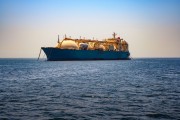In case we needed more evidence, the fifth round of climate science assessments from the Intergovernmental Panel on Climate Change has reaffirmed, again, that burning fossil fuels is warming the planet. But its latest release, focused on solutions, shows that solving the climate conundrum is also eminently affordable: the cost to transition the globe off of fossil fuels to cleaner sources energy is just 0.06 per cent of global growth a year.
That means the global economy would grow at 1.94 per cent per year instead of two per cent. Not a bad investment given the high cost of inaction.
Here’s some more good news: B.C. is already on board for an energy shift. As new opinion research commissioned by the Pembina Institute, the Pacific Institute for Climate Solutions, and Clean Energy Canada shows, the majority of British Columbians not only want to move away from using and exporting fossil fuels, they also see economic benefits in doing so.
Asked if B.C. should transition away from using fossil fuels toward cleaner sources of energy to prevent climate change from getting worse, more than three quarters of British Columbians (78%) agreed. When asked if the province should decrease its reliance on fossil fuel exports to avoid future boom and bust economic cycles, over two thirds (67%) said yes. And when we asked whether the province has a good opportunity to create jobs and grow the economy by developing the solutions needed to transition away from fossil fuels, three quarters (74%) said it does.
These results are encouraging. Though they don’t address the speed with which British Columbians are willing to undertake these transitions or the approaches they prefer, they do indicate that B.C. residents are keen to find ways to move beyond fossil fuels and toward cleaner sources of energy.
The province has had some success reducing fossil fuel use and increasing cleaner energy options thanks to the first phase of its climate action plan. Policies like the carbon tax and low-carbon fuel standard provide an incentive to use less fossil fuels and create less carbon pollution.
But those policies were implemented in 2008 and progress has now largely stalled. From our poll results, British Columbians appear ready to move ahead with a second phase. And thankfully, there’s no shortage of ideas regarding what those next steps could be.
As a starting point, the province could push ahead with the commitments it made last year with Washington, Oregon and California in the Pacific Coast Action Plan on Climate and Energy. Those commitments include getting 10 per cent of government and company vehicles to be electric by 2016, and leading a transition to homes and buildings that use very little energy.
When it comes to decreasing the province’s reliance on fossil fuels exports, however, B.C. is moving in the opposite direction.
The provincial government recently approved a storage facility to expand coal exports. Two companies are seeking federal approval for pipeline projects that would significantly increase bitumen exports from Kitimat and Vancouver. And B.C. is going all in on a liquefied natural gas plan that could — if the government’s ambitious plans come to fruition — generate three-quarters as much carbon pollution in B.C. by 2020 as Alberta’s oilsands.
While there are scenarios in which natural gas could help mitigate dangerous climate disruption by displacing coal-fired electricity in Asia, there are also scenarios in which natural gas just makes matters worse. The province is certainly keen to promote LNG as a climate solution but to date has left significant questions unanswered about how this might play out.
Regardless, fossil fuel exports appear to be out of step with the two-thirds of British Columbians that say the province should decrease its reliance on them to avoid future boom and bust economic cycles. The recent Tumbler Ridge coal mine closures demonstrate that British Columbians are right to be wary of the potential for economic busts.
Meanwhile, international markets for clean energy have a positive outlook, precisely because the world is looking for cleaner energy solutions. For B.C. this could mean anything from designing and exporting technologies like wind turbines and biomass energy systems, to developing the software that helps to efficiently manage the energy that buildings and industries use.
Developing and exporting clean energy technologies and services would not only help other jurisdictions to legitimately reduce their carbon pollution, but could also make our own communities more economically resilient — the market for clean energy is currently poised to be worth $3 trillion by 2020.
Transitioning B.C. off of fossil fuels shouldn’t be a difficult decision to make. After all, it’s what most British Columbians say they want.





